
-
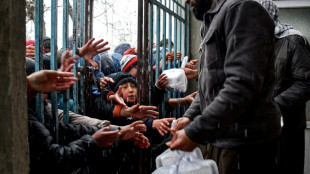 Millions of children to suffer from Trump aid cuts
Millions of children to suffer from Trump aid cuts
-
Veteran Wallaby Beale set for long-awaited injury return

-
 Syria's Druze take up arms to defend their town against Islamists
Syria's Druze take up arms to defend their town against Islamists
-
Tesla sales plunge further in France, down 59% in April

-
 US calls on India and Pakistan to 'de-escalate'
US calls on India and Pakistan to 'de-escalate'
-
Israel reopens key roads as firefighters battle blaze

-
 Europe far-right surge masks divisions
Europe far-right surge masks divisions
-
James will mull NBA future after Lakers playoff exit

-
 Ukraine's chief rabbi sings plea to Trump to side with Kyiv
Ukraine's chief rabbi sings plea to Trump to side with Kyiv
-
Australian mushroom meal victim 'hunched' in pain, court hears

-
 Lakers dumped out of playoffs by Wolves, Rockets rout Warriors
Lakers dumped out of playoffs by Wolves, Rockets rout Warriors
-
Booming tourism and climate change threaten Albania's coast

-
 US reaching out to China for tariff talks: Beijing state media
US reaching out to China for tariff talks: Beijing state media
-
Tariffs prompt Bank of Japan to lower growth forecasts

-
 Kiss faces little time to set Wallabies on path to home World Cup glory
Kiss faces little time to set Wallabies on path to home World Cup glory
-
Serbian students, unions join forces for anti-corruption protest

-
 Slow and easily beaten -- Messi's Miami project risks global embarrassment
Slow and easily beaten -- Messi's Miami project risks global embarrassment
-
Fan in hospital after falling to field at Pirates game

-
 Nuclear power sparks Australian election battle
Nuclear power sparks Australian election battle
-
Tokyo stocks rise as BoJ holds rates steady

-
 Bank of Japan holds rates, lowers growth forecasts
Bank of Japan holds rates, lowers growth forecasts
-
'Sleeping giants' Bordeaux-Begles awaken before Champions Cup semis

-
 Napoli eye Scudetto as Inter hope for post-Barca bounce-back
Napoli eye Scudetto as Inter hope for post-Barca bounce-back
-
Germany's 'absolutely insane' second tier rivalling Europe's best

-
 PSG minds on Arsenal return as French clubs scrap for Champions League places
PSG minds on Arsenal return as French clubs scrap for Champions League places
-
UK WWII veteran remembers joy of war's end, 80 years on

-
 Myanmar junta lets post-quake truce expire
Myanmar junta lets post-quake truce expire
-
Rockets romp past Warriors to extend NBA playoff series

-
 Messi, Inter Miami CONCACAF Cup dream over as Vancouver advance
Messi, Inter Miami CONCACAF Cup dream over as Vancouver advance
-
UN body warns over Trump's deep-sea mining order

-
 UK local elections test big two parties
UK local elections test big two parties
-
US judge says Apple defied order in App Store case

-
 Seventeen years later, Brood XIV cicadas emerge in US
Seventeen years later, Brood XIV cicadas emerge in US
-
Scorching 1,500m return for Olympic great Ledecky in Florida

-
 Israel's Netanyahu warns wildfires could reach Jerusalem
Israel's Netanyahu warns wildfires could reach Jerusalem
-
Istanbul lockdown aims to prevent May Day marches

-
 Formation Metals Announces Appointment of Adrian Smith to Advisory Committee
Formation Metals Announces Appointment of Adrian Smith to Advisory Committee
-
Cerrado Gold Announces Q4 And Annual 2024 Financial Results

-
 Australian guard Daniels of Hawks named NBA's most improved
Australian guard Daniels of Hawks named NBA's most improved
-
Mexico City to host F1 races until 2028

-
 Morales vows no surrender in bid to reclaim Bolivian presidency
Morales vows no surrender in bid to reclaim Bolivian presidency
-
Ukraine, US sign minerals deal, tying Trump to Kyiv
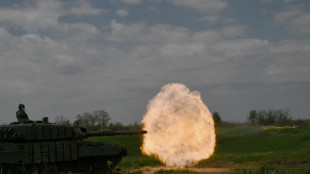
-
 Phenomenons like Yamal born every 50 years: Inter's Inzaghi
Phenomenons like Yamal born every 50 years: Inter's Inzaghi
-
Ukraine, US say minerals deal ready as Kyiv hails sharing
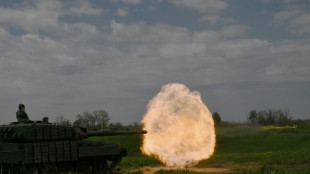
-
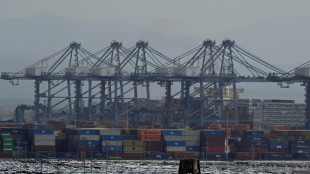 Global stocks mostly rise following mixed economic data
Global stocks mostly rise following mixed economic data
-
O'Sullivan says he must play better to win eighth snooker world title after seeing off Si Jiahui

-
 Sabalenka eases past Kostyuk into Madrid Open semis
Sabalenka eases past Kostyuk into Madrid Open semis
-
Netflix's 'The Eternaut' echoes fight against tyranny: actor Ricardo Darin

-
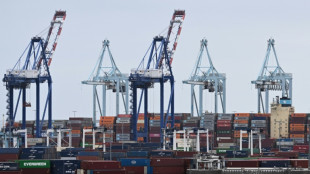 US economy unexpectedly shrinks, Trump blames Biden
US economy unexpectedly shrinks, Trump blames Biden
-
Barca fight back against Inter in sensational semi-final draw


India and Pakistan's Kashmir fallout hits economy too
Rapidly deteriorating relations between India and Pakistan over a deadly shooting in Kashmir are starting to have small but prickly economic consequences for both nations.
The killing of 26 men on Tuesday in Indian-administered Kashmir, the deadliest attack on civilians in the Himalayan region in a quarter of a century, triggered public outrage across the world's most populous country.
India has unveiled a series of mostly symbolic diplomatic measures against Pakistan, after accusing its regional rival of supporting "cross-border terrorism".
Islamabad, which rejected the allegations, responded Thursday with similar tit-for-tat measures -- but upped the ante by halting trade with New Delhi and closing its airspace to Indian airlines.
Experts say that while the retaliatory moves will not have an immediate or far-reaching impact, it will likely result in longer and more expensive flights for Indians, while forcing Pakistan to increase pharmaceutical imports from other countries.
Pakistan's decision to close its airspace to carriers from its neighbour will see journeys from India to Central Asia, Europe and North America take up to two hours longer.
"We are currently looking at, on average, an extra 60 minutes to 120 minutes for flights depending on where they go," Sanjay Lazar, aviation expert and CEO of Avialaz Consultants, told AFP.
- 'Sabre rattle' -
Pakistan's move is expected to hurt Air India, owned by Indian conglomerate Tata Group, the most.
Air India said that some flights to North America, Europe and the Middle East will have to take an "alternative extended route".
And the extra flying time may eventually make flights more expensive.
"There is extra fuel burn, because you're taking a more circuitous route," Lazar said.
"And if you add an extra stop on the route, then you incur additional crew and landing costs too."
Airfares could rise if restrictions continue beyond six months, though airlines are unlikely to hike up fares immediately to avoid the risk of "not appearing patriotic enough", he added.
Mark D Martin, of Martin Consulting, said ticket prices could rise by more than 35 percent to Middle East destinations and by over 45 percent to Europe.
"It's always the airline business that gets impacted when India and Pakistan spar and sabre rattle," Martin said.
"Let's hope better sense prevails, and this situation deescalates, as this will have an earning impact on airline financials."
Indian government data shows that when Islamabad closed its airspace in 2019 -- after New Delhi hit it with airstrikes in response to an attack in Kashmir -- domestic airlines saw a financial cost of nearly 5.5 billion rupees ($64.3 million) during the nearly five-month-long shutdown.
- Third country trade -
But analysts say Pakistan's decision to halt trade is unlikely to have a major impact, as regular diplomatic flare-ups between the two nations over decades have prevented close economic ties.
India exported less than $450 million in goods to Pakistan between April 2024 and January 2025, a tiny fraction of its overall shipments.
Key items included pharmaceutical products worth over $110 million, and sugar worth over $85 million.
"Imports from Pakistan were negligible -- just $0.42 million, limited to niche items like figs, basil and rosemary herbs," Ajay Srivastava of Global Trade Research Initiative, a New Delhi-based think tank, said in a briefing note.
But Islamabad also said Thursday it had suspended "all trade with India" including "to and from any third country through Pakistan".
It is not immediately clear how this would impact indirect trade through countries such as the United Arab Emirates or Singapore.
Indirect trade is far higher, totalling around $10 billion, according to Srivastava.
"Informal sources say that Pakistan imports several Indian products this way, including chemicals, pharmaceuticals, cotton and yarn," he said.
"On the other hand, India may receive Himalayan pink salt and dry fruits such as dates, apricots, and almonds from Pakistan, also routed through third countries."
C.Garcia--AMWN